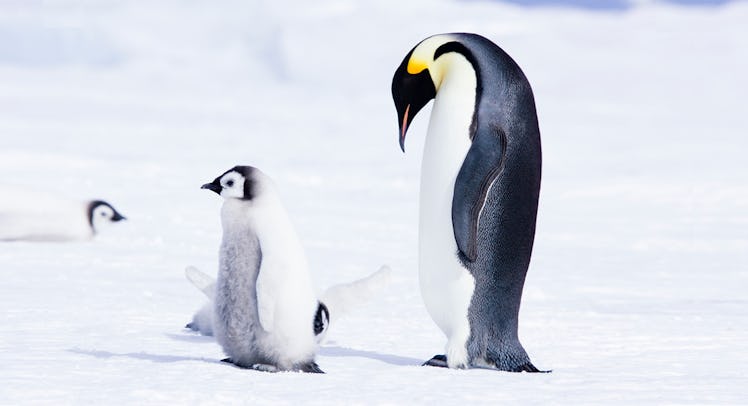What Human Parents Can Learn From Penguins
#5. Communication is key.

Emperor penguin parents have it tough. They have been known to travel some 70 miles, one way, from the waters where they feed to their protective sea ice-breeding grounds. Here, courtship lasts four to six weeks, then the dad is on his own to incubate the egg, which he tucks under his brood flap and balances on his feet for around 50 to 60 days. The chick hatches and the mom returns from feeding to relieve the dad, who has now lost up to half his body weight and has to walk back — another 70 treacherous miles — to eat enough to survive. Now that’s some dedicated parenting.
Dr. Barbara Wienecke, a decorated seabird ecologist who has wintered and summered with emperor penguins, including the Dumont d’Urville colony, shed some light for us on the lessons human parents can take away from emperor penguin parents. She offers up one caveat: Not all penguins are great parents. “There are marked differences in parenting style and success,” says Wienecke. “Some penguins are definitely better parents than others. So what I am about to describe refers mainly to well established and experienced breeders.” From stellar penguin parent to human parent, here are some of the penguin practices we all can learn from.
1. Keep Them Close
There is only one breeding season each year and therefore one chance for emperor penguins to reproduce. Once they produce an egg, the battle to hatch it and care for their offspring begins. If their egg is lost or the chick dies, it’s game over for that year. Toward the time when eggs start to hatch, fights often emerge among the busy parents and the wannabe parents.
“Penguins who lost their egg tend to hang around the colony and, at times, try to steal a baby penguin from its parents. A parent can suddenly find him or herself surrounded by a group of non-breeders (or failed breeders) and under vicious attack,” says Wienecke. “They defend their chick with all their might but, unfortunately, are not always successful.”
2. You Can Persevere
Emperor penguins walk great distances from the ocean where they feed to reach their breeding grounds near the coast — and they trudge the distance multiple times. The reality is, these birds are far faster swimming than they are toddling on their webbed feet. And you thought carrying bags from the grocery store was a chore.
“The distances they walk across often involve truly awful ice — hard with sharp edges, terribly uneven, often with high ridges that the penguins can’t cross,” says Wienecke. “They could just give up, but they keep coming back to feed their chick. I have seen adults return to the colony with ghastly wounds (probably inflicted by leopard seals), yet they drag themselves back home to feed the chick.”
3. Take Care of Yourself
Searching for food is not easy and often not fruitful for emperor penguin parents — there’s no Whole Foods stocked with fish and krill at the outskirts of their breeding grounds. “They travel huge distances to find suitable prey, and when they find a patch they do not stop until their tummy is full,” Wienecke says. “Of course they have to eat to feed themselves, as well as bring back food for the youngsters. It’s quite a balancing act, but the successful parents do it so well.”
4. Show a Little Tenderness
Whether human or penguin, the kids are always hungry. Chicks often have to wait for days to get fed because their breeding grounds, essentially the nursery for these babies, are far from the ocean where penguins hunt. To fulfill their parental duties during the breeding cycle, the mother and father go without eating for months in order to care for their egg and then chick. The father will lose ½ his body weight in the process.
“When a chick is still small and sits on a parent’s feet, they call and call and call to get food. Since the parent still has some food in the stomach to share, it’s not too bad,” says Wienecke. “But if the other parent is late coming back home from the ocean, the little guys just don’t shut up. A parent often still tries to regurgitate something. They often appear to calm down the little caller by touching them with their beak and tucking them gently under the brood flap again.”
5. Communication Is Key
Both the mother and father emperor penguin will take solo stints caring for the egg or chick while the other parent returns to the ocean to feed. But, as long as they don’t get eaten by a leopard seal or taken out by another tragedy, they always come back to their baby. How do they find their little one among the thousands of black and while birds in the colony?
“They call, and they listen for their chick’s distinctive voice … then they call again and listen,” says Wienecke. “Emperor penguins do not have nests and as the chicks get older and are no longer guarded by a parent, they run around a lot. Still, the parents track them down in absolutely no time. Once they have found their offspring there is a lot of chatter among them.”
6. Put Family First
Emperor penguins are very focused on their family. “When we work near emperor penguins, there are always some birds that do not have any family responsibilities. These birds are often curious and come over to see what these weird looking creatures are all about. At times they even follow us when we try to get away from them,” says Wienecke. “In comparison, penguins with chicks are not easily sidetracked or deterred. They often don’t even give us as much as a glance. They go straight back to their chick. Penguins on a mission, no doubt about that.”
This article was originally published on